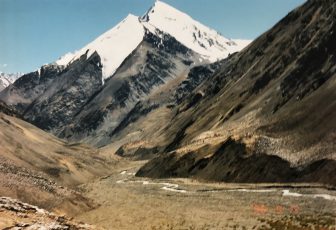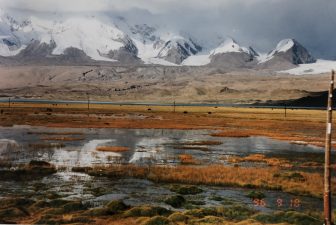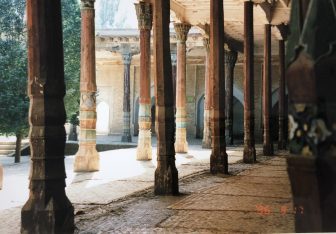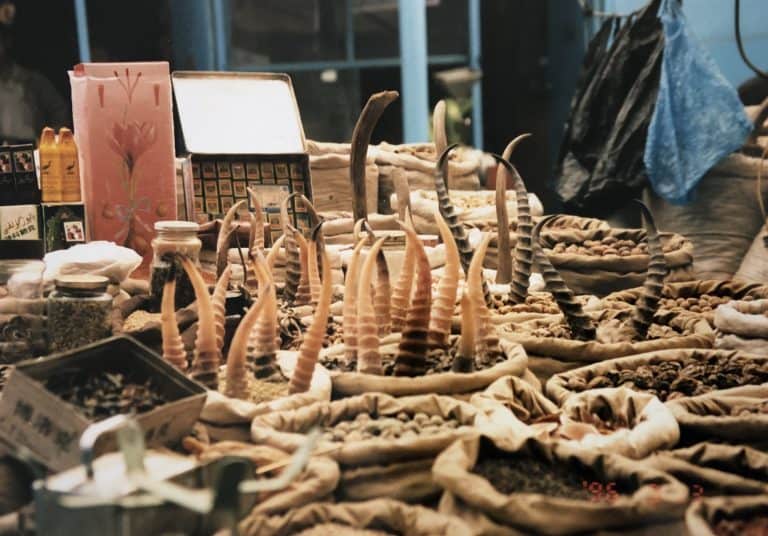
[ Sept.2020 ] We went to Urumchi by bus from Turpan in China.
Again the bus was a clunker and it took about 5 hours.
On the way, I saw the scar from the flood which our guide had told us about the day before.
In the desert, the water is very precious, but once they have a heavy rain, they will have a disaster apparently.
We arrived in Urumchi to find it a big city.
Because it was a big city, I should have got nervous, but instead, I felt relieved seeing people moving in civilised way.
As soon as we arrived, we had to look for a hotel.
Four of them rejected us, saying “没有(méi yǒu ; no vacancy)”.
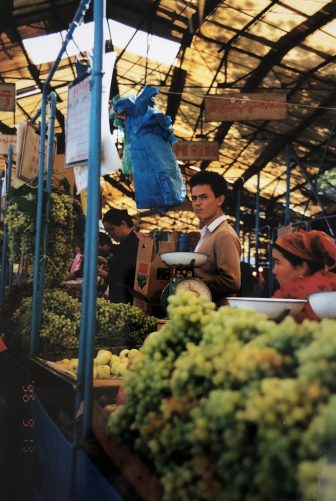
So we went to a telephone box to try other two.
It was a sort of telephone box, but in fact it was a small hut with a woman in it and there were two ordinary telephones on a stand.
After using the phone, you had to pay 3 jiao (=0.3 yuan ; $1=8.28 yuan in those days) to the person.
This woman and a young man who happened to be there were very kind and helpful and thanks to them, we found a room in Xinjiang Hotel (200 yuan).
My guidebook did not recommend this hotel, but actually the room was clean and the staff was pleasantly brisk, so I liked it there.
I had an interesting conversation here about the laundry.
Because we had been travelling for a long time, we needed to wash our clothes now and again and we usually used the laundry service at hotels.
I tried hard to find out about the laundry service of this hotel with the woman at the hotel and in the end found that they did not have the service here.
And she suggested that we should go to ‘干洗店 (=dry cleaner’s)’ just around the corner.
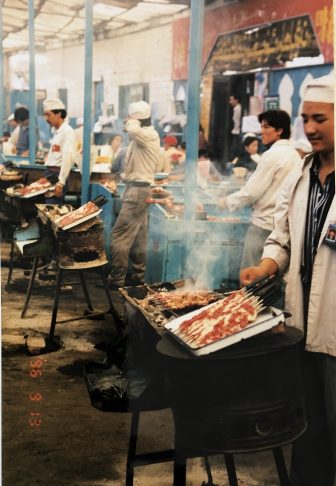
She was very patient and tried hard until I understood what she meant, so I enjoyed this conversation.
At 干洗店, there was no problems and we had our shirts and trousers, about 10 items cleaned for 50 yuan.
After that, we walked rapidly heading for the market in Tian Chi Lu.
This was much more interesting market than the one in Turpan, selling various colourful things such as foods, clothes, fabrics, folk crafts, carpets and so on.
We had three skewers of Shish Kebab (1 yuan per skewer).
People here were friendly, too and I got a very good impression of Urumchi.
There was an alley just next to the market and there were many food shops.
When we walked there, a man from another Shish Kebab shop called out to us, “Shashlik, Khorosho!” in broken Russian, so we had another 2 each (one was liver).
Urumchi is not too far from Kazakhstan which used to be a part of Soviet Union, so I wondered if many Russians visited here.
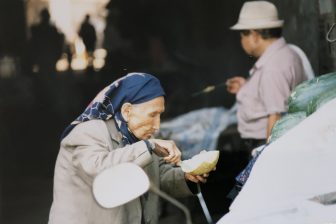
After that, we had a melon as well.
At the stall, as I gestured to eat, the vendor cut one energetically.
The melon had a surprisingly strong taste and it was so good!
We had a half each.
When I asked the price, the woman wrote 17, so I was giving her 17 yuan, but she said ‘no, no!’ and took 2 yuan from my wallet and gave me 3 jiao change.
So it was only 1.7 yuan.
In Japan this kind of melon would cost as much as 3000 yen ($28).
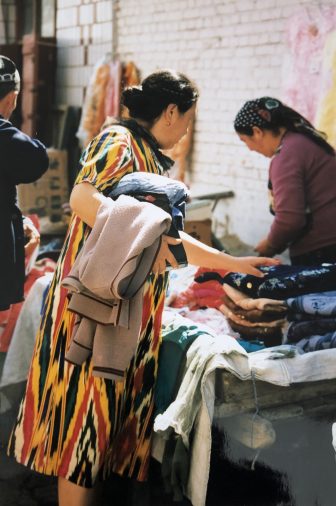
After satisfying our mouth and stomach, we went back to the market to buy some colourful silk fabric of the traditional Uihgur pattern.
It cost 40 yuan for 2 metres.
Then we went to a dressmaker which I had seen just outside of the market and asked to make a blouse for me by drawing a picture.
This dressmaker looked very surprised at first when we entered, maybe because she did not usually have any foreign customers, but she seemed happy about my idea.
I used the pages of Uighur language in my guidebook to communicate with her and agreed that it would be ready in two days and the price was 20 yuan.
Another thing I wanted to buy was a rug.
In Xinjiang, there is a place called Hotan which is famous for its carpet weaving and their carpets were sold in this market in Urumchi.
After looking at many rugs, I bought a pair of cushion size rug for 260 yuan.
A shop assistant here asked me to set the time and date for his Japanese made calculator, so I did.
I noticed his watch was made in Japan, too, but the next to the date, the day was shown in the worm crawling Uighur language.
I enjoyed Urumchi very much, maybe because it was an ordinary town for ordinary people, not like Turpan which relied on tourism.


